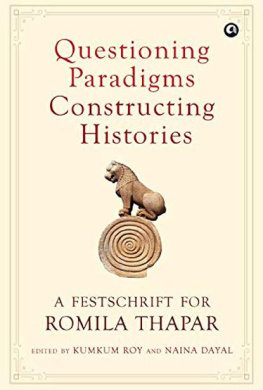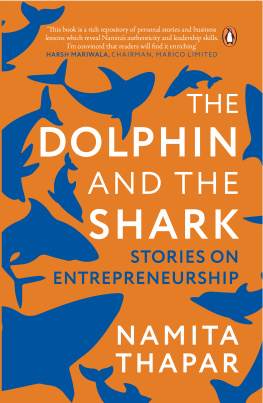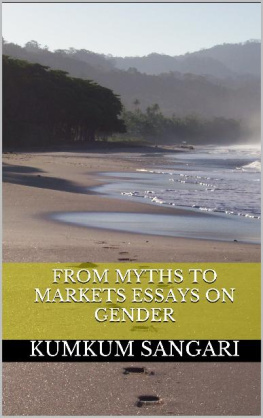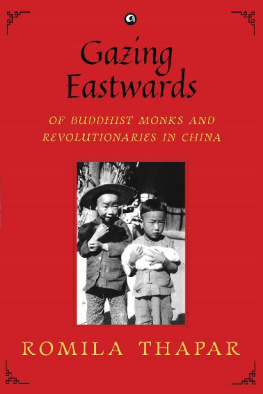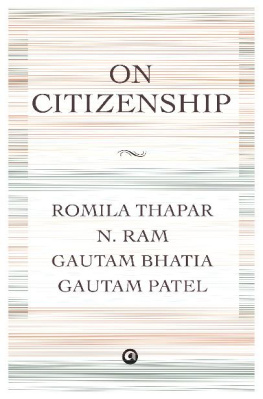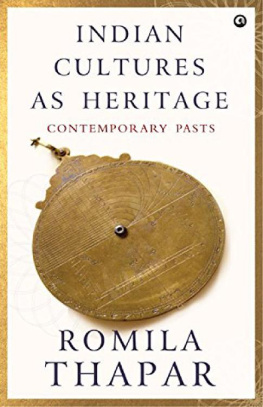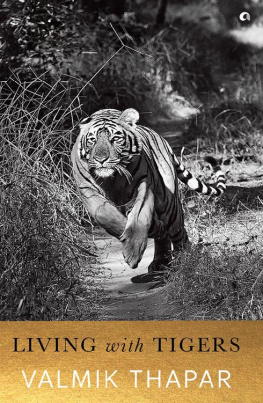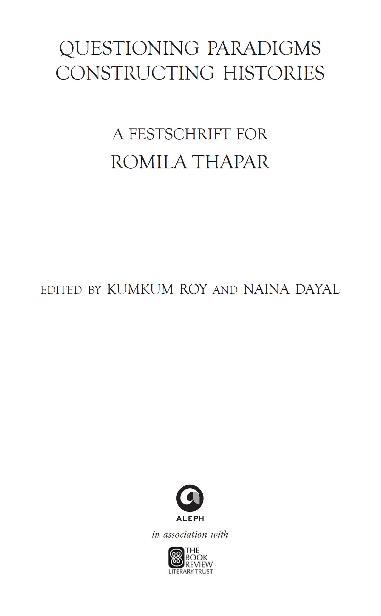QUESTIONING PARADIGMS
CONSTRUCTING HISTORIES
ALEPH BOOK COMPANY
An independent publishing firm
promoted by Rupa Publications India
First published in India in 2019 by
Aleph Book Company
7/16 Ansari Road, Daryaganj
New Delhi 110002
Copyright The Book Review Literary Trust 2019
Introduction copyright Kumkum Roy and Naina Dayal 2019
Essays/Articles copyright Individual contributors 2019
All rights reserved.
The authors have asserted their moral rights.
The views and opinions expressed in this book are the authors own and the facts are as reported by them, which have been verified to the extent possible, and the publishers are not in any way liable for the same.
No part of this publication may be reproduced, transmitted, or stored in a retrieval system, in any form or by any means, without permission in writing from Aleph Book Company.
ISBN: 978-93-88292-34-4
1 3 5 7 9 10 8 6 4 2
This book is sold subject to the condition that it shall not, by way of trade or otherwise, be lent, resold, hired out, or otherwise circulated without the publishers prior consent in any form of binding or cover other than that in which it is published.
CONTENTS
PATRICK OLIVELLE
SUSMITA BASU MAJUMDAR
SUDHARSHAN SENEVIRATNE
R. CHAMPAKALAKSHMI
NACHIKET CHANCHANI
HERMANN KULKE
CHARLES MALAMOUD
ALOKA PARASHER-SEN
UMA CHAKRAVARTI
ROBERT P. GOLDMAN
ALF HILTEBEITEL
NAINA DAYAL
KUNAL CHAKRABARTI
SUNIL KUMAR
GANANATH OBEYESEKERE
KESAVAN VELUTHAT
THOMAS R. TRAUTMANN
MICHAEL WITZEL
XINRU LIU
KEVIN MCGRATH
RAJAN GURUKKAL
RANABIR CHAKRAVARTI
DHRUV RAINA
ACHIN VANAIK
JANAKI NAIR
KUMKUM ROY
MICHAEL W. MEISTER
ROMILA THAPAR
PREFACE
Hemnah pramumodah: gold acquires fragrance, is an apt description of Romila Thapars scholarship. It would be no exaggeration to say that the long years of scholarship have given Romila Thapar a patina of a savant reminiscent of the upanishadic spirit of questioning.
In an interview with Rajan Gurukkal, Romila Thapar had said: an enquiry should begin with a question. Questioning is important. I remember a conversation that I had with Sundar Sarukkai, who said that before you can postulate a question you have to have a doubt, which is of course a philosophical way of approaching it. I agree that you may begin with a doubt and that doubt can be tied into a question. The question may be something quite simple, the answer to which will further qualify what you are saying. Or it may be a question that gives you the possibility of looking at the event or the person in history from different points of view. And that one question then leads to other questions that reflect these different points of view. So I would say that the fundamental approach to any piece of research or what one is working on grows out of a question.
This attitude of enquiry has informed the choice of the theme to celebrate Romila Thapars work as a historian and a public intellectual. Contributors to Questioning Paradigms, Constructing Histories: A Festschrift for Romila Thapar were invited to begin with an assessment of Thapars work on a theme of their choice, and then refine/develop/critique Thapars ideas/arguments; or, alternatively, pick a theme from her work and write independently on it; or do a comparative study on a related theme from their own work.
This Festschrift project, mooted in July 2017, is an expression of gratitude for Romila Thapars advice and support to The Book Review over the years, but also represents our continued efforts to expand the boundaries of scholarship. The Book Review was started in January 1976. Romila Thapar joined the Editorial Advisory Board in 1987 and has been friend, philosopher and guide over the decades. She has continued to keep us committed to standards of excellence and a liberal ethos in whatever we publish. The Book Review Literary Trust was set up in 1989 to continue the publication of The Book Review and undertake activities like organizing seminars, publishing books and in general, help in the endeavour to disseminate knowledge and highlight scholarship.
Over the decades, Romila Thapar, in addition to her own research and publishing, has given unstintingly of her time to all her students and imbued them with a passion for the subject. Many of these young scholars who have made their mark in the field all over the world have acknowledged their debt to her. This became very evident from the overwhelming response to the invitation from The Book Review Literary Trust to contribute a paper to the Festschrift volume.
The project has had a very short gestation period. Within nine months of the idea being mooted in July 2017, The Book Review Literary Trust organized an international seminar at the India International Centre (1517 March 2018) to peer review the papers that were presented, most of the scholars presenting in person and some via Skype. Now, the book is ready for publication. The discussions on the presentations sparkled with a high degree of scholarship for which we thank the discussants: Ranabir Chakravarti, Charles Malamoud, Kesavan Veluthat, Kunal Chakrabarti, Rajan Gurukkal, R. Champakalakshmi, Robert P. Goldman, Uma Chakravarti (they have also contributed papers for the Festschrift) and B. P. Sahu, Bharati Jagannathan, Jaya Menon, Kanad Sinha, K. M. Shrimali, Krishna Kumar, Laxman Thakur, Meera Visvanathan, Neeladri Bhattacharya, Pankaj Jha, P. J. Cherian, P. K. Basant, Renu Thakur, Sally J. Sutherland Goldman, Suchandra Ghosh, Y. S. Alone and Zoya Hasan. We also thank the other invitees whose comments enriched the discussions.
Thanks are due to B. P. Sahu, K. M. Shrimali, Sudharshan Seneviratne, Charles Malamoud and Dipankar Gupta for chairing the different sessions at the conference. Their weaving together the threads of the discussions has been of invaluable help in the editing of this volume, as have the incisive comments of the discussants.
Once we had decided on bringing out a Festschrift for Romila Thapar, we requested Kumkum Roy and Naina Dayal to edit the volume. They agreed readily and have with total commitment and unmitigated enthusiasm structured the conference and the volume. Despite their gruelling teaching assignments they have edited the volume meticulously in record time. We thank them both for being an integral part of the project.
The conference has been supported very generously by the India International Centre, Azim Premji University, Dr Dhanesh Jain of Primus Books, Oxford University Press and the Digital Empowerment Foundation for which we thank them.
We would like to thank Sanjiv Sahai for his help in enabling us to get the necessary ministerial permissions to hold the conference. Preeti Gulati, a research student at the Centre for Historical Studies, Jawaharlal Nehru University, has meticulously cross-checked the footnotes. T. C. A. Achintya was an invaluable resource person on the IT front and was single-handedly responsible for making the Skype sessions a huge success. We thank Preeti and Achintya for their help, as also Kartik Maini and Mohona Chaudhuri for keeping a record of the discussions and preparing a detailed report, which provided valuable links to the arguments and ideas thrown up at the conference.

